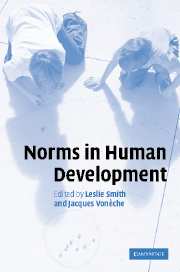Book contents
- Frontmatter
- Contents
- List of figures
- List of tables
- List of contributors
- Acknowledgments
- 1 Norms in human development: introduction
- Part I Norms and development in epistemology
- Part II Norms in moral and social development
- Part III Norms in cognitive development
- 9 Can psychology be a quantitative science, or is Kant right after all? Normative issues in psychometrics
- 10 Norms and intuitions in the assessment of chance
- 11 Making conditional inferences: the interplay between knowledge and logic
- References
- Index
10 - Norms and intuitions in the assessment of chance
Published online by Cambridge University Press: 22 September 2009
- Frontmatter
- Contents
- List of figures
- List of tables
- List of contributors
- Acknowledgments
- 1 Norms in human development: introduction
- Part I Norms and development in epistemology
- Part II Norms in moral and social development
- Part III Norms in cognitive development
- 9 Can psychology be a quantitative science, or is Kant right after all? Normative issues in psychometrics
- 10 Norms and intuitions in the assessment of chance
- 11 Making conditional inferences: the interplay between knowledge and logic
- References
- Index
Summary
Are children able to draw normatively correct probabilistic inferences? The readers may find this question rather odd given the well-documented difficulties of intelligent adults to solve various sorts of probability problems. The aim of this chapter is to show that children do possess an elementary competence to reason about uncertain events, and that the existence of such a competence sheds light on the properties of adults' reasoning and its relation to the normative models of probability.
There is an ongoing controversy in the adult literature about the factors that hinder correct probabilistic reasoning in naive individuals (i.e. those who have not mastered the probability calculus or other formal calculi, like standard logic). According to an influential, evolutionary view, naive individuals fail simply because the human mind is inherently unable to reason about the probability of single events, and only individuals trained in probability calculus can succeed. Besides empirical evidence, a normative argument appears to support such a view: since a norm for measuring chance (i.e. the probability calculus) emerged only in the seventeenth century, it follows that probabilistic reasoning is not a natural, mental capacity and that before the seventeenth century individuals could not even consider the possibility of such a yardstick. An alternative is the extensional competence view. Under this view, untutored individuals are able to draw correct probabilistic inferences, even if they have not learnt the probability calculus.
- Type
- Chapter
- Information
- Norms in Human Development , pp. 220 - 236Publisher: Cambridge University PressPrint publication year: 2006
- 2
- Cited by



